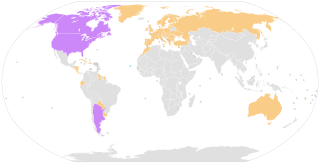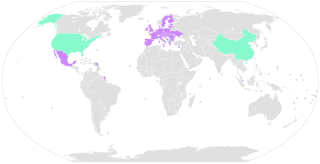Jurisdiction is the legal term for the legal authority granted to a legal entity to enact justice. In federations like the United States, areas of jurisdiction apply to local, state, and federal levels.
Conflict of laws is the set of rules or laws a jurisdiction applies to a case, transaction, or other occurrence that has connections to more than one jurisdiction. This body of law deals with three broad topics: jurisdiction, rules regarding when it is appropriate for a court to hear such a case; foreign judgments, dealing with the rules by which a court in one jurisdiction mandates compliance with a ruling of a court in another jurisdiction; and choice of law, which addresses the question of which substantive laws will be applied in such a case. These issues can arise in any private-law context, but they are especially prevalent in contract law and tort law.
Hague Convention may refer to:

The Hague Conference on Private International Law (HCCH) is an intergovernmental organisation in the area of private international law, that administers several international conventions, protocols and soft law instruments.

The Convention on the Recognition and Enforcement of Foreign Arbitral Awards, commonly known as the New York Convention, was adopted by a United Nations diplomatic conference on 10 June 1958 and entered into force on 7 June 1959. The Convention requires courts of contracting states to give effect to private agreements to arbitrate and to recognize and enforce arbitration awards made in other contracting states. Widely considered the foundational instrument for international arbitration, it applies to arbitrations that are not considered as domestic awards in the state where recognition and enforcement is sought.

The Convention on the Service Abroad of Judicial and Extrajudicial Documents in Civil or Commercial Matters, more commonly called the Hague Service Convention, is a multilateral treaty that was adopted in The Hague, The Netherlands, on 15 November 1965 by member states of the Hague Conference on Private International Law. It came into existence to give litigants a reliable and efficient means of serving the documents on parties living, operating or based in another country. The provisions of the convention apply to service of process in civil and commercial matters but not criminal matters. Also, Article 1 states that the Convention shall not apply if the address of the person to be served with the document is not known.
In law, the enforcement of foreign judgments is the recognition and enforcement in one jurisdiction of judgments rendered in another ("foreign") jurisdiction. Foreign judgments may be recognized based on bilateral or multilateral treaties or understandings, or unilaterally without an express international agreement.

The Brussels Regime is a set of rules regulating which courts have jurisdiction in legal disputes of a civil or commercial nature between individuals resident in different member states of the European Union (EU) and the European Free Trade Association (EFTA). It has detailed rules assigning jurisdiction for the dispute to be heard and governs the recognition and enforcement of foreign judgments.
International arbitration is arbitration between companies or individuals in different states, usually by including a provision for future disputes in a contract.

The Hague Convention on parental responsibility and protection of children, or Hague Convention 1996, officially Convention of 19 October 1996 on Jurisdiction, Applicable Law, Recognition, Enforcement and Co-operation in respect of Parental Responsibility and Measures for the Protection of Children or Hague Convention 1996 is a convention of the Hague Conference on Private International Law. It covers civil measures of protection concerning children, ranging from orders concerning parental responsibility and contact to public measures of protection or care, and from matters of representation to the protection of children's property. It is therefore much broader in scope than two earlier conventions of the HCCH on the subject.
International litigation, sometimes called transnational litigation, is the practice of litigation in connection with disputes among businesses or individuals residing or based in different countries.

A contract is a legally enforceable agreement that creates, defines, and governs mutual rights and obligations among its parties. A contract typically involves the transfer of goods, services, money, or a promise to transfer any of those at a future date. In the event of a breach of contract, the injured party may seek judicial remedies such as damages or rescission. Contract law, the field of the law of obligations concerned with contracts, is based on the principle that agreements must be honoured.
International matrimonial law is an area of private international law. The area specifically deals with relations between spouses and former spouses on issues of marriage, divorce and child custody. In the last 50 years, the States Members of the Hague Conference on Private International Law have attempted to harmonize domestic matrimonial laws and judicial rulings across international borders in these areas.

Justice Jean-Paul Beraudo is a lawyer, academic and author of legal works. He was Justice at the French Supreme Court and vice-chairman of the International Court of Arbitration. He lectures on International Private Law and International Trade Law at Panthéon-Sorbonne University and on Company law at Sciences-Po, Paris. The International Institute for the Unification of Private Law (UNIDROIT) appointed him correspondent for France and a member of the scientific committee.
The term international child abduction is generally synonymous with international parental kidnapping,child snatching, and child stealing. However, the more precise legal usage of international child abduction originates in private international law and refers to the illegal removal of children from their home by an acquaintance or family member to a foreign country. In this context, "illegal" is normally taken to mean "in breach of custodial rights" and "home" is defined as the child's habitual residence. As implied by the "breach of custodial rights," the phenomenon of international child abduction generally involves an illegal removal that creates a jurisdictional conflict of laws whereby multiple authorities and jurisdictions could conceivably arrive at seemingly reasonable and conflicting custodial decisions with geographically limited application. Such a result often strongly affects a child's access and connection to half their family and may cause the loss of their former language, culture, name and nationality, it violates numerous children's rights, and can cause severe psychological and emotional trauma to the child and family left behind.

Brussels II Regulation (EC) No 1347/2000, which came into force on 1 March 2001, sets out a system for the allocation of jurisdiction and the reciprocal enforcement of judgments between European Union Member States and was modelled on the 1968 Brussels Convention on Jurisdiction and the Enforcement of Judgments in Civil and Commercial Matters. It was intended to regulate domains that were excluded from the Brussels Convention and Brussels I. The Brussels II Regulation deals with conflict of law issues in family law between member states; in particular those related to divorce and child custody. The Regulation seeks to facilitate free movement of divorce and related judgments between Member States.

The Maintenance Regulation (EC) No 4/2009, formally the Council Regulation (EC) on jurisdiction, applicable law, recognition and enforcement of decisions and cooperation in matters relating to maintenance obligations, is a European Union Regulation on conflict of law issues regarding maintenance obligations. The regulation governs which courts have jurisdiction and which law it should apply. It further governs the recognition and enforcement of decisions. The regulation amends the Brussels Regulation, which covers jurisdiction in legal disputes of a civil or commercial nature between individuals more broadly.

The Hague choice of court convention, formally the Convention of 30 June 2005 on Choice of Court Agreements, is an international treaty concluded within the Hague Conference on Private International Law. It was concluded in 2005, and entered into force on 1 October 2015. The European Union, Denmark, Mexico, Singapore and the United Kingdom are parties to the convention. China, Israel, North Macedonia, Ukraine and the United States signed the convention, but did not ratify.

The Hague Judgments Convention, formally the Convention of 2 July 2019 on the Recognition and Enforcement of Foreign Judgments in Civil or Commercial Matters is an international treaty concluded within the Hague Conference on Private International Law. It was concluded in 2019, and will enter into force on 1 September 2023 for the European Union and Ukraine. The convention governs the recognition of judgements in civil and commercial matters.









